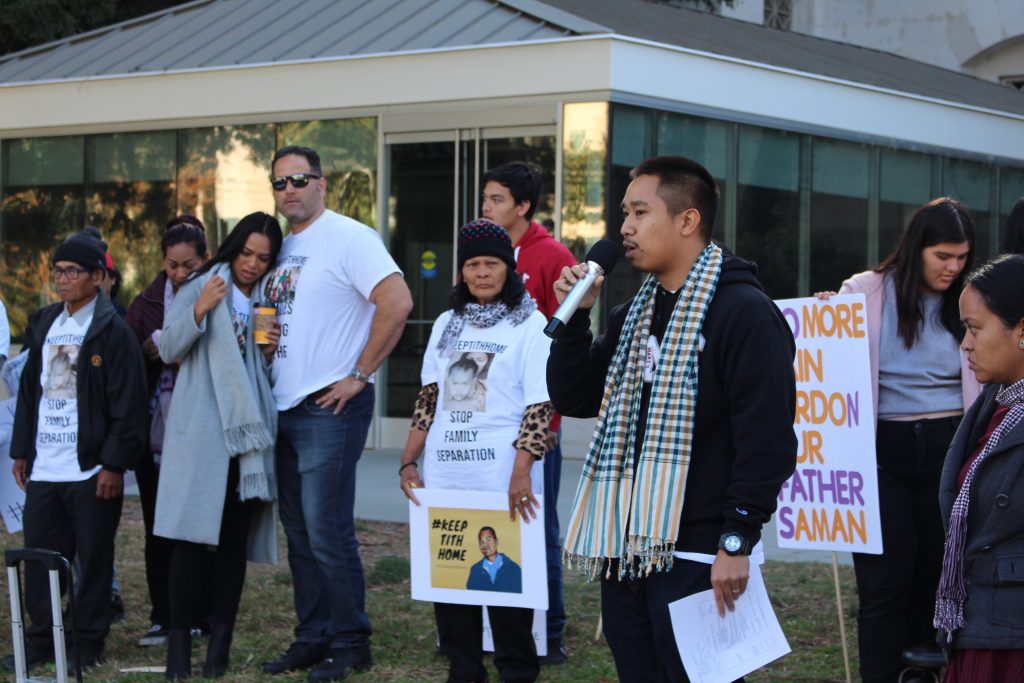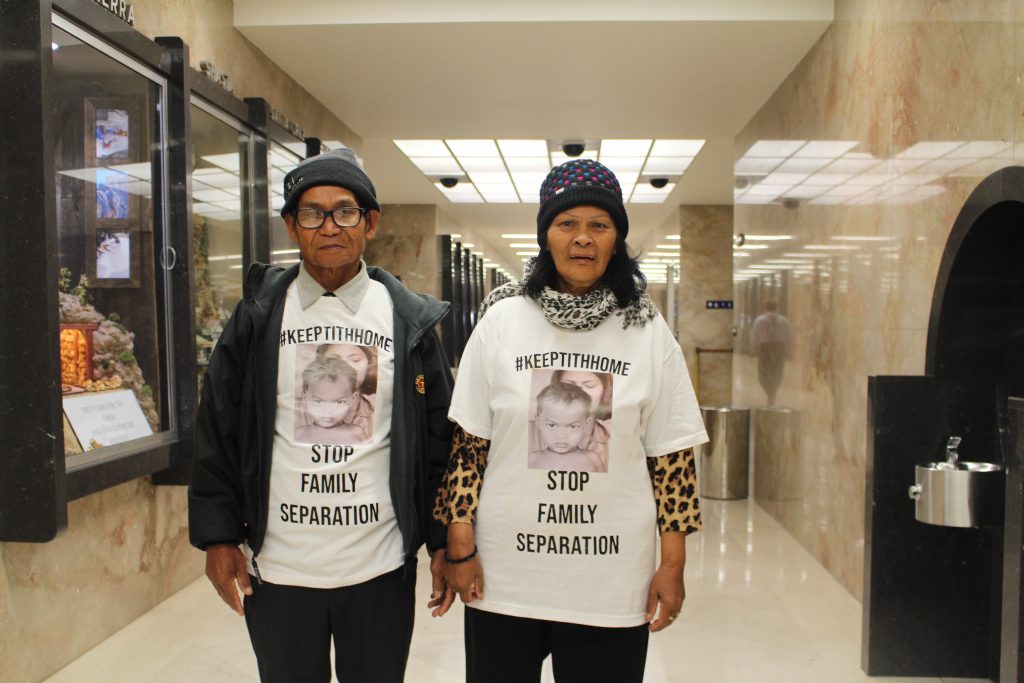Immigration and prison reform advocates across the state are calling on Governor Gavin Newsom to stop California prisons from collaborating with Immigration and Customs Enforcement.
Organizations such as Asian Prisoner Support Committee and Asian Law Caucus say 11,000 prisoners in the state are in danger of facing additional ICE detention and deportation after their prison sentence.
California is considered to be a sanctuary state, as part of Senate Bill No. 54 passed in late 2018 that allows local police to not comply with federal authorities on immigration matters.
However, Stacy Suh, who advocates for domestic abuse survivors, said the sanctuary state definition has its limits and it does not always extend to prisoners or former inmates. In the United States, “violation of law” is one way for legal, non-U.S. citizens to be deported.
Suh said Liyah Birru is one example. Birru is an Ethiopian immigrant who came to the United States as a legal resident. She was convicted for shooting her white husband, but said it was self-defense after he routinely abused her. Suh said Birru served four years in prison but was transported to a county jail after her sentence. Afterward, she was put in immigration detention and has been there for a year.
“Because ICE knows when people are getting out of the state prison system because of that collaboration happening,” Suh said. “That’s why she was transferred to Yuba County Jail right away. She wasn’t able to enjoy her freedom after she finished her sentence.”
The Cambodian community has especially been hit by these ICE raids. According to Rhummanee Hang from the Oakland-based Center for Empowering Refugees and Immigrants, there has been an increase of raids ordered by the Trump administration in the Southeast Asian communities, targeting people who had prior convictions. So far, there are hundreds of Cambodian refugees with criminal convictions who have been detained nationwide. According to an NPR report, Cambodian deportations have increased 279% since 2017, after the Cambodian government agreed to issue visas.
Some refugees, however, received pardoned. According to the Asian Law Caucus, former California Governor Jerry Brown pardoned six Cambodian refugees in 2018 after an especially harsh ICE raid in the Southeast Asian community.
This March, Hang said the Cambodian community suffered another round of ICE raids. Among those arrested were her brother. Hang, along with Asian Prisoner Support Committee and Asian Law Caucus, advocated and had four Bay Area refugees pardoned by current Governor Gavin Newsom.
Despite this, Newsom recently vetoed a provision that stopped ICE from entering prisons and holding migrants beyond their release date. His veto explanation, which said he was concerned with time-sensitive prison transportation like medical treatments, confused bill sponsors.
In hopes of having current prisoners also included in the definition of sanctuary, a crowd of more than 80 advocates, family members and supporters rallied outside the state’s Capitol Building on Nov. 1.
The rally highlighted Cambodian refugee Tith Ton, who is facing ICE detention after serving 22 years in San Quentin for murdering a rival gang member as a teenager. His petition collected over 40,000 signatures asking Newsom to pardon Ton and end the ICE-prison relationship in California.
Nathaniel Tan, one of the organizers with the Asian Prisoner Support Committee, kicked off the rally by criticizing the prison system.
“The state of California loves to say that they are for prison reform and that they love immigrants and that this country is made of immigrants,” he said. “But if you are an incarcerated immigrant or refugee in this country or this state, Governor Newsom has yet to tell us that we matter.”

Ton was born in a labor camp during the Khmer Rouge genocide in Cambodia. His family escaped to a refugee camp and then traveled to the United States. However, the family suffered from violence in their Fresno neighborhood. According to the rally’s petition, Ton killed the rival gang member. Although he was only 16 at the time, he was charged as an adult and given a life sentence.
Over 20 years later, Ton is now a substance abuse counselor at San Quentin prison, where he also facilitates Ethnic Studies classes with Asian Prisoner Support Committee. Ton’s family says the prison will be handing him over to ICE when he is released on parole in mid-November and he will be sent to Cambodia. #KeepTithHome has been the hashtag circulating on social media in hopes of raising awareness about not only Ton’s situation, but other prisoners facing similar situations.
Tan said Ton was in disbelief when he found out about the amount of signatures his petition received. He recalls Ton asking, “Why? What do they know about me? What do they see in me?”
“And I said, ‘Because they love you.’ And I think love has become a powerful force in this movement,” Tan replied.
Ton’s family drove from Fresno to make it to the rally. His parents wore shirts with childhood pictures printed on the front. One of his nieces told the crowd that the only time she was able to call her uncle, he gave her a list of life principles to follow and asked her to recite them back to make sure she remembered them.
His former cellmate, PeeJay Ai, expressed how he watched Ton changed his life from the day he was incarcerated. Ai said he wanted Newsom to know that incarcerated individuals have people who they “want to be with, just like anyone else”.
“Tith did his time and I feel like today, even after all he has gone through, he’s being punished again. Like, there’s no recognition for the amount of suffering he’s gone through — the overcoming of everything,” Ai said. “And just not to acknowledge this transformation is a sin.”

Ton’s younger sister, Jenna Ton, said her only memories of her brother was him teaching her how to play baseball.
“I have dreamt of him coming home to us, one day, so that we could have a chance to reconnect and make up for the 20-plus years that he’s been gone, that we’ve lost. He’s never had a chance to meet my husband, my two children,” she said.
Mara Ren, another niece, said Ton went to prison around the time she was born. Now 24, she was one of the few young members of the family who got to meet him, during a dance event in San Quentin.
Ren said her family was shocked to see the support Ton has gotten.
“We came out here and we didn’t really know that we have so much support like that. It’s like breathtaking, almost,” she said. “We didn’t know there were so many people supporting each other in the movement. It’s so powerful.”
Other family members also went up to the mic to speak about their incarcerated loved ones. The wife of detainee Charles Joseph, who is at risk of being deported to Fiji, tearfully recalled being at the gates when he was meant to be released, only to have ICE take him. Saman Pho’s family held signs reading, “Please don’t deport my daddy.”
Between speeches, the crowd listened to sermons, sang resistance chants, and at the end, even danced. Soon after, the rally moved inside Capitol Building where the family hand-deliver Ton’s petition to Kelli Evans, Newsom’s deputy legal affairs secretary for Criminal Justice. Evans came out and thanked the crowd for coming.
“(Governor Newsom) reads every application, every petition he receives very, very carefully and very closely,” she said. “So, I want to thank you for coming today. We really, really appreciate it.”
People who came out were from all walks of life: Khmer elders led a prayer. Mothers cradled their children during chants as kids ran through the rally. Law students drove from UC Davis to show support.
This was encouraging for Hang. She said intergenerational turnout is important for their anti-deportation work since the Southeast Asian community is primarily 1.5 generation (born in one country but grew up in another) and deportation had differing effects across a family’s age group.
“Their parents are affected by this because they’ve escaped genocide, war-torn countries to be here. Their kids are affected by this because they’re about to lose their father to something that they may not even understand they may not even understand why this is happening in the first place, especially if their conviction is like decades old,” she said. “The work is, has been, and has to be intergenerational.”
“There’s this phrase that we often say which is hope is contagious,” Hang added. “You kind of have to be, kind of have to believe in it in order for us to keep this work going. We’re not done. We’re not ever going to be done until everybody’s free.”
Before the organized headed off to lobby on ICE detainees’ behalf, the rally ended with one last chant from Ton’s nephew.
“When we fight,” he started.
And the crowd cheered back, “We win.”
